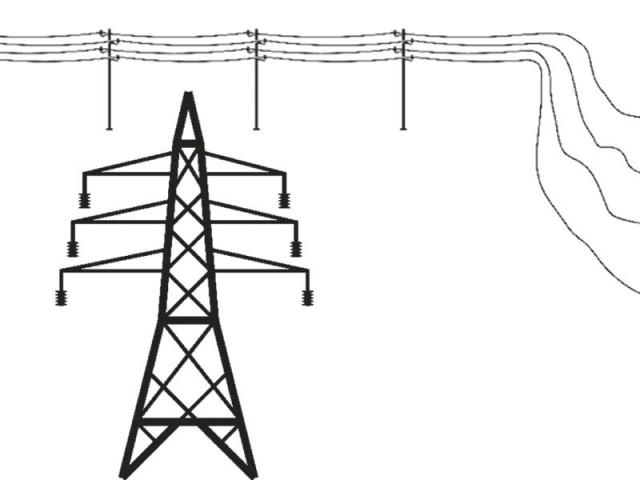Power-savvy: Don’t use kunda, there are two other ways to light[en] up your bill
Energy consultant Nida Farid shares tips on how to reduce the bill without compromising your lifestyle.

Energy consultant Nida Farid shares tips on how to reduce the bill without compromising your lifestyle. DESIGN: OMER ASIM
Contrary to popular belief in Karachi, the ‘kunda’ is not the only way to save up on your electricity bill. No, this is not another spam asking you to buy expensive electrical wiring and goods. These simple tricks have been tried and tested by scientists in average households and could reduce your bills by up to half.
Engineering consultant Nida Rizwan Farid shared these tips at a session, titled ‘Small tricks for large savings’ at The Second Floor cafe on Thursday evening. “Applying these simple tricks will not only allow you to enjoy the same comfort level, you will also be paying much less for it.”
The almost three-hour session was laced with a few tasteless jokes here and there as Farid attempted to liven up the audience while she laboriously walked through her presentation. This audience may have been more difficult to impress than her previous ones as several participants kept bombarding her with questions. “I pay Rs40,000 in electricity bills every month,” screamed one audience member proudly, looking around to see if others had been impressed by his billing amount. “Forty thousand!” he repeated. The other audience members appeared to be unmoved. “I even check my meter readings every day. I have the readings from today in my pocket,” he exclaimed again. The audience sighed, realising how long the evening was going to be.
How are we billed?
Farid carried on with the presentation, explaining the tariff system used by the K-Electric to charge its customers. The energy consumption rates, in Karachi, comprise different tiers and the users are charged according to how many units of electricity they consume. The units are measured in kWh. Farid explained that the government heavily subsidised the rates, which ended up amassing circular debt. “As consumers, it is our duty to conserve electricity,” she advised. “And the best way to conserve energy is through increasing the efficiency of its usage.”
Electricity is produced nationally for an average of approximately Rs12 per unit. By the time it reaches the consumer, it has cost the power utility around Rs15, including the transmission costs. The price for electricity is so heavily subsidised by the government that the first 50 units are currently priced at Rs2 per unit. “This is the basic energy needed by a household,” explained Farid, adding that one may run two to three light bulbs, a fan and a TV or fridge with 50 units per month. “Anything above that is a luxury.” She warned that with the new tariff likely to come in soon, the average bill would increase by 50% to 100%.
How do we waste electricity?
The next few slides were certainly an eye-opener for many. The audience listened in awe as Farid related how much energy we actually waste. “An old incandescent bulb is only about 1% efficient,” she remarked. “This means that the bulb wastes around 99% of the energy supplied to it.” An energy saver, on the other hand is about 10% efficient, which gives it leverage over the old bulb.
Armed with data on the efficiency and prices of household products such as refrigerators, washing machines, different kinds of light bulbs, fans and air conditioners, Farid walked the audience through the amount of energy being wasted by these appliances. “A washing machine manufactured in 2012 is over 50% more energy efficient than one manufactured 20 years ago,” she revealed. “When you go to buy an appliance, make sure you know how much energy it would consume. Make an informed decision to see if it suits your needs and is also not too heavy on your pockets.”
For Farid, humans don’t need energy; they need services. “Energy is just the means to get those services,” she smiled.
Wise Choices
• Switch off electrical appliances when not in use
• Measure the size of the room you wish to install an AC in and then ascertain exactly what size of AC you need. A bigger AC uses more electricity and fails to serve its purpose
• Use energy savers or LFLs (tube lights). They have a longer life and are more efficient
• Ascertain the number of bulbs you would need to illuminate a space. Extra bulbs are an unnecessary cost
• When buying a new appliance, make sure you evaluate its energy consumption and its cost of purchase.
• Perform regular maintenance on your household appliances so that they do not end up consuming more power because of wear and tear.
• Paint your roof white. This will keep your house cooler as the white colour reflects at least 50% of the sun’s heat.
• Use a cold wash in washing machines
• Upgrade to new energy-efficient appliances
Published in The Express Tribune, May 24th, 2014.


















COMMENTS
Comments are moderated and generally will be posted if they are on-topic and not abusive.
For more information, please see our Comments FAQ